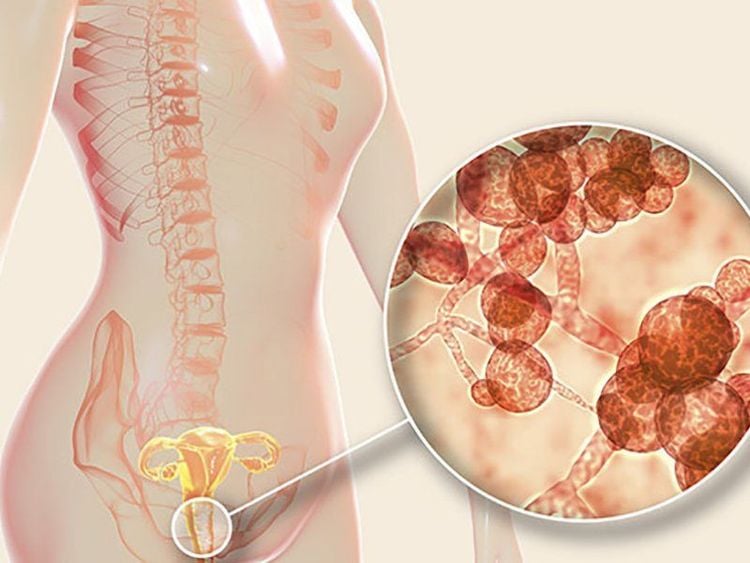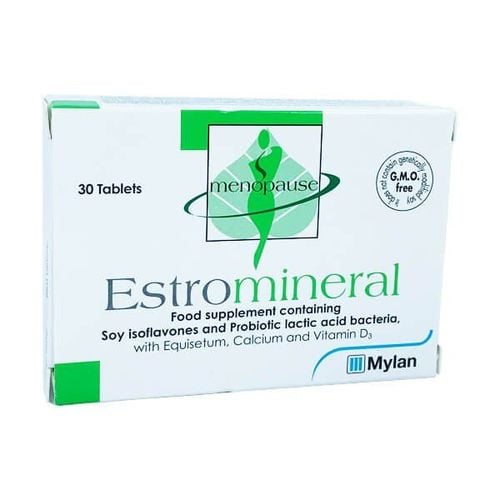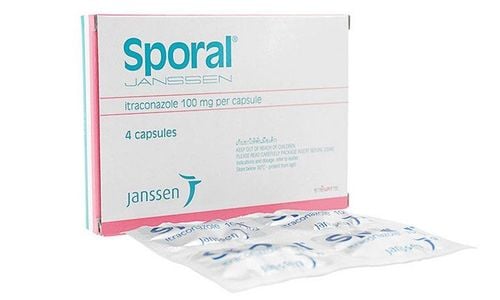This is an automatically translated article.
Candidiasis, also known as vaginal thrush, is an inflammatory condition of the vagina, commonly occurring in women. People infected with candida often experience burning and itching sensation in the vaginal area. To treat candida, it is necessary to use the right medicine and enough so that it does not recur or experience any complications.
1. What is Candida?
Candidiasis is an inflammation of the vaginal tract caused by an overgrowth of the fungus. People infected with this fungus often have symptoms of burning pain, itching or abnormal discharge in the vagina, vulva (the external genitalia of women).
It can be said that fullness is a common disease, up to 75% of women have a yeast infection at least once in their life. If not treated completely, the disease can recur and be difficult to cure completely. This disease is not considered a sexually transmitted disease, but it usually appears after the first time having sex. Oral sex also carries the potential for candida infection.
When treating candida, it is necessary to use the correct and sufficient dose of prescribed medicine to completely treat the disease without complications. With frequent fungal infections more than 4 times a year, you need to see a doctor for advice as well as a clear treatment plan.
2. What causes candida infection?
According to many studies, most cases of vaginitis are caused by the fungus Candida albicans. In the vaginal area, there is always a balance between fungi and resident bacteria. In which, the resident bacteria Lactobacillus has the role of inhibiting the overgrowth of fungi. If the fungi overgrow or they invade the vaginal cell layers, the balance of bacteria will be disrupted. The things that lead to this condition are:
Use of antibiotics : there are many antibiotics that can throw off the balance of the vaginal flora Pregnancy Immunocompromised body Uncontrolled diabetes Use Using drugs that contain hormones that increase estrogen (female hormone) excessively

Tìm ra được nguyên nhân sẽ giúp điều trị nấm candida hiệu quả hơn
3. Common symptoms of candida infection
Symptoms of this fungal infection can vary from person to person. In addition, they can range from mild to severe, including:
In the vaginal or vulvar area, there is an itchy, uncomfortable feeling When having sex or urinating, burning in the private area Vaginal redness and swelling When having sex often hurts Vaginal dryness, vaginal discharge, abnormal vaginal discharge, with thick, friable white patches (closer to cheese)
4. Complications can occur if not treated thoroughly
There are two types of fungal vaginitis, complicated and uncomplicated. If you have one of the following symptoms, your condition will be classified as a complication:
Severity: In the vagina, there is red inflammation, sores or cracks. The patient feels a lot of pain in these areas. 4 or more fungal infections in a year May occur in pregnant women, patients with uncontrolled diabetes Weakened immune system, especially in people with HIV Atypical fungal infections You should see your doctor doctor when you see unusual symptoms in the vaginal area. If you are in the process of being treated for a fungus, and when you find that your condition does not improve after taking the medicine, see your doctor for better measures.

Người bệnh có thể gặp biến chứng nếu không điều trị nấm Candida
5. How to treat candida
To treat fungus depends on the extent of the disease and the degree of recurrence (how often or not). For mild to moderate cases, with few recurrences, the following treatment options are available:
Use vaginal suppositories for a short period of time, eg: antifungal drugs, usually prescribed by a doctor for 3 to 5 days. 7 days will help improve the condition. You can use antifungal medications that come in the form of a cream, ointment, or suppository. Treat with a single dose of the drug orally. In severe cases, longer treatment with more dosage may be required. However, pregnant women should not take high-dose antifungal drugs by mouth.
How to treat recurrent candidiasis or severe cases
If you have followed your doctor's instructions and the disease still does not improve or has a relapse within 2 months, or immediately notify your doctor. themselves for an alternative.
For severe cases, repeated many times, the doctor will prescribe stronger treatment methods such as:
Long-term vaginal use, antifungal medication within 2 weeks (used continuously every day). In the 6 months after taking each dose 1 week. You should follow it closely to get the best results during the treatment. Multi-dose oral antifungal agents Find out the causes of complicated fungal vaginitis. Vaginitis caused by Candida yeast infection is quite common. If you find your body has any unusual symptoms, go to medical facilities for examination and treatment. In case you have been treated for vaginal thrush before, please inform your doctor in detail about the duration and course of treatment.
Vinmec International General Hospital is currently a prestigious medical facility in Vietnam. Here, there is a team of specialists in Obstetrics and Gynecology at Vinmec who are well-trained and experienced, with a complete and modern medical equipment system, able to perform in-depth examination and early detection of diseases. gynecological pathology and provide effective treatment regimens for patients.
Please dial HOTLINE for more information or register for an appointment HERE. Download MyVinmec app to make appointments faster and to manage your bookings easily.













